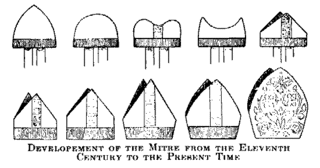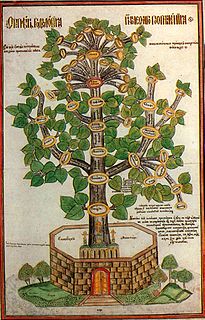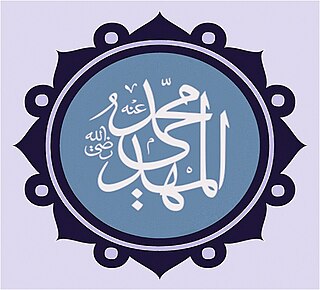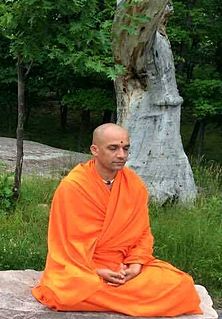 W
WIn Catholicism, an abbess is the female superior of a community of nuns, which is often an abbey.
 W
WAbbot is an ecclesiastical title given to the male head of a monastery in various western religious traditions, including Christianity. The office may also be given as an honorary title to a clergyman who is not the head of a monastery. The female equivalent is abbess.
 W
WAga Khan is a title held by the Imām of the Nizari Ismāʿīli Shias. Since 1957, the holder of the title has been the 49th Imām, Prince Shah Karim al-Husseini, Aga Khan IV. All Aga Khans claim descent from Muhammad, last prophet of Islam.
 W
WAkhund is a Persian title or surname for Islamic scholars, common in Iran, Afghanistan, Tajikistan, Pakistan, Bangladesh and Azerbaijan. Other names for similar Muslim Scholar include sheikh and mullah.
 W
WAn apostle, in its most literal sense, is an emissary, from Greek ἀπόστολος (apóstolos), literally "one who is sent off", from the verb ἀποστέλλειν (apostéllein), "to send off". The purpose of such sending off is usually to convey a message, and thus "messenger" is a common alternative translation; other common translations include "ambassador" and "envoy".
 W
WIn Christian theology and ecclesiology, apostles, particularly the Twelve Apostles, were the primary disciples of Jesus according to the New Testament. During the life and ministry of Jesus in the 1st century AD, the apostles were his closest followers and became the primary teachers of the gospel message of Jesus. There is also an Eastern Christian tradition derived from the Gospel of Luke of there having been as many as seventy apostles during the time of Jesus' ministry.
 W
WThe Archbishop of Canterbury is the senior bishop and principal leader of the Church of England, the symbolic head of the worldwide Anglican Communion and the diocesan bishop of the Diocese of Canterbury. The current archbishop is Justin Welby, who was enthroned at Canterbury Cathedral on 21 March 2013. Welby is the 105th in a line which goes back more than 1400 years to Augustine of Canterbury, the "Apostle to the English", sent from Rome in the year 597. Welby succeeded Rowan Williams.
 W
WThe title archimandrite, used in Eastern Christianity, originally referred to a superior abbot whom a bishop appointed to supervise several 'ordinary' abbots and monasteries, or to the abbot of some especially great and important monastery.
 W
WA caliphate or khilāfah is an Islamic state under the leadership of an Islamic ruler with the title of caliph, a person considered a politico-religious successor to the Islamic prophet Muhammad and a leader of the entire Muslim world (ummah). Historically, the caliphates were polities based on Islam which developed into multi-ethnic trans-national empires. During the medieval period, three major caliphates succeeded each other: the Rashidun Caliphate (632–661), the Umayyad Caliphate (661–750), and the Abbasid Caliphate (750–1517). In the fourth major caliphate, the Ottoman Caliphate, the rulers of the Ottoman Empire claimed caliphal authority from 1517 and maintained Sunni Islam as the official religion. Throughout the history of Islam, a few other Muslim states, almost all hereditary monarchies such as the Abbasid caliphs under protection of Mamluk Sultanate (Cairo) and Ayyubid Caliphate, have claimed to be caliphates. The first caliph was Abu Bakr and the last caliph was Abdulmejid II.
 W
WCardinals are the most senior members of the clergy of the Catholic Church, being second in precedence only to the Pope. They are appointed to the rank of cardinal in addition to their existing position within the Church. Collectively, they constitute the College of Cardinals, and are appointed for life.
 W
WShankaracharya (शङ्कराचार्य) is a commonly used title of heads of monasteries called mathas in the Advaita Vedanta tradition of Hindu Dharma. The title derives from Adi Shankara, teachers from the successive line of teachers dating back to him are known as Shankaracharyas.
 W
WA coarb, from the Old Irish comarbae, meaning "heir" or "successor", was a distinctive office of the medieval church among the Gaels of Ireland and Scotland. In this period coarb appears interchangeable with "erenach", denoting the episcopally nominated lay guardian of a parish church and headman of the family in hereditary occupation of church lands. The coarb, however, often had charge of a church which had held comparatively high rank in pre‐Norman Ireland, or one still possessed of relatively extensive termon lands.
 W
WA deacon is a member of the diaconate, an office in Christian churches that is generally associated with service of some kind, but which varies among theological and denominational traditions. Major Christian churches, such as the Catholic Church, the Oriental Orthodox Churches, the Eastern Orthodox Church, the Scandinavian Lutheran Churches and the Anglican Church, including the Free Church of England, view the diaconate as part of the clerical state.
The dean of the College of Cardinals presides over the College of Cardinals in the Roman Catholic Church, serving as primus inter pares. The position was established in the early 12th century. He always holds the rank of a cardinal bishop, and is assisted by a vice-dean. Both are elected by and from the cardinal bishops who are not Eastern Catholic patriarchs, with their election subject to papal confirmation. Except for presiding over the college, the dean and vice-dean have no power over the other cardinals. In the order of precedence in the Catholic Church, the dean and vice-dean, as the two most senior cardinals, are placed second and third, respectively, after the pope.
 W
WThe Gyalwang Drukpa is the honorific title of the head of the Drukpa Lineage, one of the independent Sarma (new) schools of Vajrayana Buddhism. This lineage of reincarnated masters started from Tsangpa Gyare, the first Gyalwang Drukpa and founder of the school. The 12th Gyalwang Drukpa, Jigme Pema Wangchen, is the current lineage holder. He was born at Lake Rewalsar, India in 1963.
 W
WThe ecumenical patriarch is the archbishop of Constantinople–New Rome and ranks as primus inter pares among the heads of the several autocephalous churches that make up the Eastern Orthodox Church. He is regarded as the representative and spiritual leader of Orthodox Christians worldwide. The term ecumenical in the title is a historical reference to the Ecumene, a Greek designation for the civilised world, i.e. the Roman Empire, and it stems from Canon 28 of the Council of Chalcedon.
 W
WEmir, sometimes transliterated amir, amier, or ameer, is a word of Arabic origin that can refer to a male monarch, aristocrat, holder of high-ranking military or political office, or other person possessing actual or ceremonial authority. The title has a long history of use in the Arab World, East Africa, West Africa, Afghanistan, and the Indian subcontinent. In the modern era, when used as a formal monarchical title, it is a cognate for prince, applicable both to a son of a hereditary monarch, and to a reigning monarch of a sovereign principality, namely an emirate. The feminine form is emira, a cognate for princess. Prior to its use as a monarchical title, the term "emir" was historically used to denote a "commander", "general", or "leader". In contemporary usage, "emir" is also sometimes used as either an honourary or formal title for the head of an Islamic, or Arab organisation or movement.
 W
WAn episcopal polity is a hierarchical form of church governance in which the chief local authorities are called bishops. It is the structure used by many of the major Christian Churches and denominations, such as the Catholic, Eastern Orthodox, Oriental Orthodox, Church of the East, Anglican, and Lutheran churches or denominations, and other churches founded independently from these lineages.
 W
WThe Executive Minister of the Iglesia ni Cristo is the primary leader of the Philippine-based Christian denomination, the Iglesia ni Cristo.
 W
WA gabbai, also known as shamash or parnas or warden is a beadle or sexton, a person who assists in the running of synagogue services in some way. The role may be undertaken on a voluntary or paid basis. A shamash or gabbai can also mean an assistant to a rabbi.
 W
WThe Ganden Tripa, also spelled Gaden Tripa, is the title of the spiritual leader of the Gelug school of Tibetan Buddhism, the school that controlled central Tibet from the mid-17th century until the 1950s. The 103rd Ganden Tripa, Jetsun Lobsang Tenzin died in office on 21 April 2017. Jangtse Choejey Kyabje Jetsun Lobsang Tenzin Palsangpo is the current Ganden Tripa.
 W
WThe Grand Mufti of Saudi Arabia is the most senior and most influential Muslim religious and legal authority in Saudi Arabia. The holder of the position is appointed by the King. The Grand Mufti is the head of the Permanent Committee for Islamic Research and Issuing Fatwas.
 W
WThe Grand Mufti of India is the most senior and influential religious authority of the Islamic Community of India. The incumbent is Sheikh Abubakr Ahmad, general secretary of All India Sunni Jamiyyathul Ulama, who was conferred the title in February 2019 at the Gareeb Nawaz Peace Conference held at Ramlila Maidan, New Delhi, organised by the All India Tanzeem Ulama-e-Islam.
 W
WHegumen, hegumenos, or igumen is the title for the head of a monastery in the Eastern Orthodox and Eastern Catholic Churches, similar to the title of abbot. The head of a convent of nuns is called a hegumenia or ihumenia. The term means "the one who is in charge", "the leader" in Greek.
 W
WHujjat al-Islam is an honorific title meaning "authority on Islam" or "proof of Islam".
 W
WImam is an Islamic leadership position.
 W
WKahen is a religious role in Beta Israel second only to the monk or falasyan. Their duty is to maintain and preserve the Haymanot among the people. This has become more difficult by the people's encounter with the modernity of Israel, where most of the Ethiopian Jewish people now live.
 W
WKriwe-Kriwajto also known as Kriwe, was the chief priest in the Prussian mythology. He lived in the Prussian sanctuary Romuva that was a central worship place in the region and once a capital city of Prussia. Kriwe-Kriwajto was one of the most influential persons in the Prussian society and people from all of their tribes visited Romuva to make sacrifices. He was responsible for all the major rituals and his influence was recognized by other tribes of Balts, such as Curonians and Lithuanians.
 W
WMahasiddha is a term for someone who embodies and cultivates the "siddhi of perfection". A siddha is an individual who, through the practice of sādhanā, attains the realization of siddhis, psychic and spiritual abilities and powers.
 W
WThe Mahdi, meaning "the rightly guided one", is an eschatological Messianic figure who, according to Sunni and Shia belief, will appear at the end of times to rid the world of evil and injustice. In Islam, it is said that he will appear alongside Jesus and establish the Divine kingdom of God.
 W
WA mufti is an Islamic jurist qualified to issue a nonbinding opinion (fatwa) on a point of Islamic law (sharia). The act of issuing fatwas is called iftāʾ. Muftis and their fatwas played an important role throughout Islamic history, taking on new roles in the modern era.
 W
WMullah is derived from the Arabic word mawlā, meaning "vicar", "master" and "guardian". However, since this word is used ambiguously in the Quran, some publishers have described its usage as a religious title as inappropriate. The term is sometimes applied to a Muslim man, educated in Islamic theology and sacred law. In large parts of the Muslim world, particularly Iran, Pakistan, Bangladesh, Azerbaijan, Afghanistan, Eastern Arabia, Turkey and the Balkans, Central Asia, the Horn of Africa and other parts of the Indian subcontinent, it is the name commonly given to local Islamic clerics or mosque leaders.
 W
WNirmalanandanatha Swamiji is the head of Adichunchanagiri Math.
 W
WPeer or Pir is a title for a Sufi spiritual guide. They are also referred to as a Hazrat and Sheikh or Shaykh, which is literally the Arabic equivalent. The title is often translated into English as "saint." In Sufism a Pir's role is to guide and instruct his disciples on the Sufi path. This is often done by general lessons and individual guidance. Other words that refer to a Pir include Murshid and Sarkar.
 W
WThe pope, also known as the supreme pontiff or the Roman pontiff, is the bishop of Rome, head of the worldwide Catholic Church and head of state or sovereign of the Vatican City State. According to Catholics, the primacy of the bishop of Rome is largely derived from his role as the apostolic successor to Saint Peter, to whom primacy was conferred by Jesus, giving him the Keys of Heaven and the powers of "binding and loosing", naming him as the "rock" upon which the church would be built. The current pope is Francis, who was elected on 13 March 2013.
 W
WThe President of the Catholic Bishops' Conference of the Philippines is the executive head of the Catholic Bishops' Conference of the Philippines.
 W
WA priest is a religious leader authorized to perform the sacred rituals of a religion, especially as a mediatory agent between humans and one or more deities. They also have the authority or power to administer religious rites; in particular, rites of sacrifice to, and propitiation of, a deity or deities. Their office or position is the priesthood, a term which also may apply to such persons collectively. A priest may have the duty to hear confessions periodically, give marriage counseling, provide prenuptial counseling, give spiritual direction, teach catechism, or visit those confined indoors, such as the sick in hospitals and nursing homes.
 W
WA prince-abbot is a title for a cleric who is a Prince of the Church, in the sense of an ex officio temporal lord of a feudal entity, usually a State of the Holy Roman Empire. The territory ruled by a prince-abbey is known as a princely abbey, a prince-abbacy or an abbey principality. The holder, however, does not hold the ecclesiastical office of a Bishop.
 W
WPrior is an ecclesiastical title for a superior, usually lower in rank than an abbot or abbess. Its earlier generic usage referred to any monastic superior. The word is derived from the Latin for "earlier" or "first".
 W
WPrior is an ecclesiastical title for a superior, usually lower in rank than an abbot or abbess. Its earlier generic usage referred to any monastic superior. The word is derived from the Latin for "earlier" or "first".
 W
WThe Samaritan High Priest is the high priest of the remaining Samaritan community in the Levant. According to the Samaritan's tradition, the office has existed continuously since the time of Aaron, the brother of Moses, and has been held by 133 priests in the last thirty-four centuries. However, the historicity of this claim is disputable. One account by Josephus suggests that its office holders are an offshoot of the Zadokite high priests of Jerusalem from around the time of Alexander the Great.
 W
WThe Supreme Leader of Iran, also referred to as Supreme Leader of the Islamic Revolution, but officially called the Supreme Leadership Authority, is the head of state and the highest political and religious authority of the Islamic Republic of Iran. The armed forces, judiciary, state television, and other key government organizations such as Guardian Council and Expediency Discernment Council are subject to the Supreme Leader. The current lifetime officeholder, Ali Khamenei, has issued decrees and made the final decisions on the economy, the environment, foreign policy, education, national planning, and other aspects of governance in Iran. Khamenei also makes the final decisions on the amount of transparency in elections, and has dismissed and reinstated presidential cabinet appointees.
 W
WIn Islam, the ulama are the guardians, transmitters, and interpreters of religious knowledge in Islam, including Islamic doctrine and law.